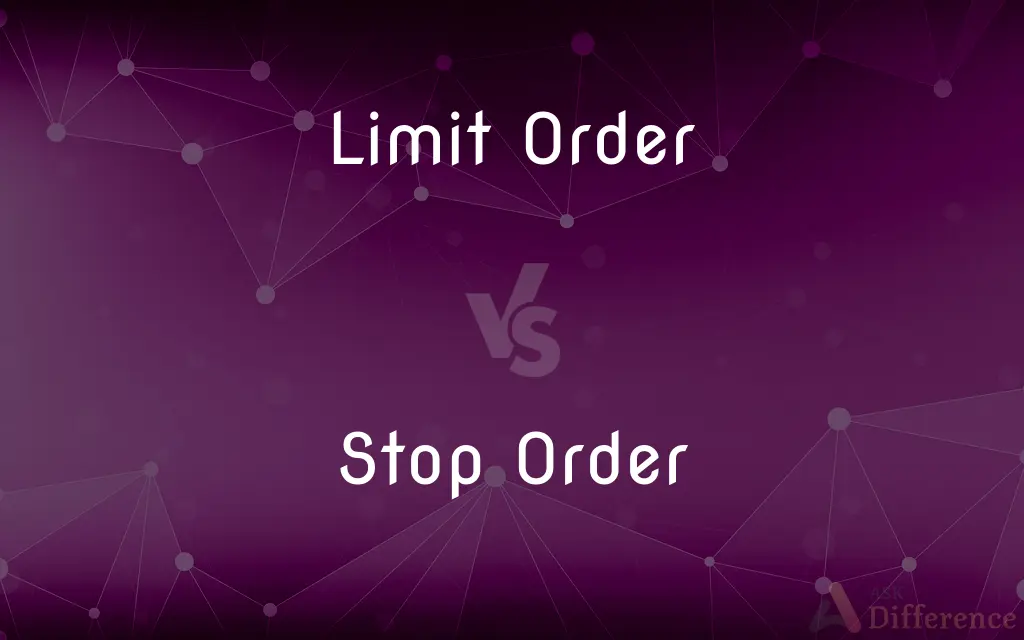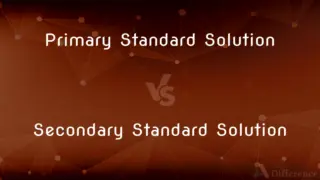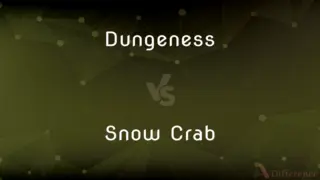Limit Order vs. Stop Order — What's the Difference?
Edited by Tayyaba Rehman — By Fiza Rafique — Published on October 31, 2023
Limit Order: An order to buy/sell at a specific price. Stop Order: Activated once a specific price is reached.

Difference Between Limit Order and Stop Order
Table of Contents
ADVERTISEMENT
Key Differences
A Limit Order is an instruction to execute a trade at a specific price or better. Conversely, a Stop Order is designed to be activated only when a particular price threshold is met.
The Limit Order ensures that the trade will not be executed unless the stock hits your desired price or a better one. On the other hand, once the stock reaches the price set in a Stop Order, the order is converted into a market order.
With a Limit Order, investors have a better chance of getting the price they want. In the case of a Stop Order, the priority is to ensure that the trade is executed, but not necessarily at the exact set price.
Investors often use Limit Orders when they're not in a hurry and want a specific price. In contrast, Stop Orders are used when the investor wants to protect profits or limit losses.
If you want to ensure buying or selling only at a favorable price, you would lean towards a Limit Order. If you're looking to buy/sell as soon as the stock hits a certain point, regardless of minor price fluctuations, a Stop Order is the go-to.
ADVERTISEMENT
Comparison Chart
Purpose
To get at least a specific price or better.
To trade once a certain price is reached.
Execution Price
Specified or better.
Not guaranteed at the exact set price.
Usage
When targeting a specific price.
When wanting to trigger a market order at a set price.
Price Movement
Activates at or better than set price.
Activates once set price is reached.
Common Use Case
Not in a rush; aiming for an exact price.
Protect profits or limit losses.
Compare with Definitions
Limit Order
A conditional trade based on a specific price.
Her Limit Order will only execute if the shares drop to her set price.
Stop Order
A defensive tool against significant market swings.
Investors use Stop Orders to protect against sudden market downturns.
Limit Order
A pre-set price threshold for executing a trade.
With a Limit Order, he ensured he wouldn't overpay for the stock.
Stop Order
A mechanism ensuring trades after specific market conditions.
To guard his investment, he set a Stop Order at a 5% drop.
Limit Order
An order with a fixed price constraint.
His Limit Order to sell will activate only when the stock reaches $100.
Stop Order
A command converting to a market order post a threshold.
She placed a Stop Order to limit her potential losses.
Limit Order
A directive to trade at a designated price.
I set a Limit Order to buy the stock at $50.
Stop Order
An order activated after reaching a specified price.
His Stop Order triggered a sale when the stock plummeted.
Limit Order
A tool for buying/selling securities at a desired price.
Using a Limit Order, she avoided selling her shares at a loss.
Stop Order
An order set to initiate upon hitting a certain price.
The stock's rapid rise caused several Stop Orders to activate.
Common Curiosities
What's a Limit Order in trading?
A Limit Order is an instruction to trade a security at a specific price or better.
Is a Stop Order's execution price guaranteed?
No, once activated, a Stop Order becomes a market order and may not execute at the exact set price.
Why would one use a Limit Order?
To target a specific buy or sell price, ensuring they don't overpay or undersell.
How does a Stop Order differ from a Limit Order?
While a Limit Order aims for a specific price, a Stop Order becomes active once a predetermined price is reached.
In what situation is a Stop Order beneficial?
It's useful to protect profits or limit potential losses by setting a price threshold.
Can I cancel a Limit Order?
Yes, unless it has already been executed.
What's the risk with Stop Orders?
They can activate due to short-term price fluctuations, potentially resulting in unintended trades.
Can a Limit Order execute at a worse price than set?
No, a Limit Order ensures execution at the set price or a better one.
When does a Stop Order become active?
It becomes active when the stock hits the specified threshold price.
Is a Stop Order the same as a Stop-Limit Order?
No, a Stop Order triggers a market order, while a Stop-Limit Order sets both a start and limit price.
Does a Limit Order have an expiration?
Yes, traders can set expirations, or it may default to the end of the trading day.
Do all brokers offer Limit and Stop Orders?
Most brokers do, but it's best to check with your specific broker for available order types.
Are Limit Orders visible to the market?
Typically, yes, but some platforms offer hidden or iceberg orders where only a portion is visible.
Can a Limit Order help in volatile markets?
Yes, it offers price protection by setting a maximum or minimum trade price.
Why might a Stop Order not execute?
If the market moves quickly past the set price without trading at it, the Stop Order might not activate.
Share Your Discovery

Previous Comparison
Primary Standard Solution vs. Secondary Standard Solution
Next Comparison
Dungeness vs. Snow CrabAuthor Spotlight
Written by
Fiza RafiqueFiza Rafique is a skilled content writer at AskDifference.com, where she meticulously refines and enhances written pieces. Drawing from her vast editorial expertise, Fiza ensures clarity, accuracy, and precision in every article. Passionate about language, she continually seeks to elevate the quality of content for readers worldwide.
Edited by
Tayyaba RehmanTayyaba Rehman is a distinguished writer, currently serving as a primary contributor to askdifference.com. As a researcher in semantics and etymology, Tayyaba's passion for the complexity of languages and their distinctions has found a perfect home on the platform. Tayyaba delves into the intricacies of language, distinguishing between commonly confused words and phrases, thereby providing clarity for readers worldwide.














































